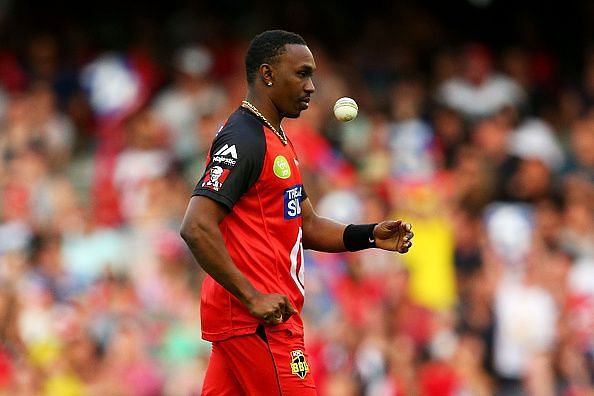
The 'right-handed Lara' who morphed into T20's bowling supremo
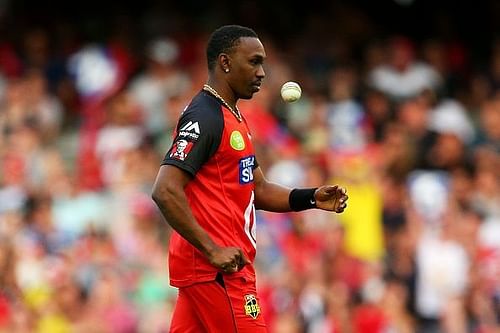
This game has a funny way of biting you in the a**. Let's see if you are around in three years. I bet you won't be here".
It's been a decade and a half, and Dwayne Bravo hasn't gone anywhere.
Andrew Flintoff's prophetic sledge in 2004 has been proved wrong, but Bravo, a 20-year-old rookie then, himself wouldn't have expected his career to unravel the way it has.
For T20 cricket's most successful bowler was once Santa Cruz's 'right-handed Brian Lara'.
The 35-year-old, retired from internationals, spoke to Sportskeeda during his stint with the Paarl Rocks in the Mzansi Super League, the latest in his long list of T20 adventures. This sport has a habit of throwing up incredulous tales, and Bravo is the protagonist of this one.
As has been the case for years, Bravo carries a funny mixture of energy and terseness: on the field, he is a silent bull, suddenly bursting into celebratory jigs; off the field, he is a man of few words.
Bravo's just concluded international career wasn't always a flowery ride, but it started off on the right track, back when Tests and ODIs were the only two formats in existence. His systematic rise took him to the Windies U-19 team, and with them, he went to the 2002 World Cup in New Zealand.
Retracing Bravo's steps, one astonishingly learns that bowling was far from his priority.
"Growing up in Santa Cruz, from primary to secondary school to my early days of playing club cricket, I always knew I had the ability to bowl, but never took it seriously".
"I went on to play youth tournaments, played for the Windies-A team as an opening batsman, and I made it to the U19 team in the World Cup".
The year was 2002. The World Cup was a whimper for the then 19-year-old, who mustered just 90 runs in seven innings. He hardly bowled back then, rolling his arm for a mere two overs in the entire tournament.
One simple suggestion completely changed his approach towards the game.
"It's only after I came back from the World Cup that I started taking my bowling more seriously. It was because of my captain back then, Richard Smith. He said I should take my bowling more seriously and asked me to start bowling in games".
"That's where it all turned around for me. In the middle of that series, because of the workload of bowling and opening the batting, I started batting down the order".
As years passed and cricket became more and more constricted, Bravo's cunning bowling found its shape. T20s launched him upwards, and by the time the IPL came, he was a settled entity in international cricket.
"I had success in the longer format as well"
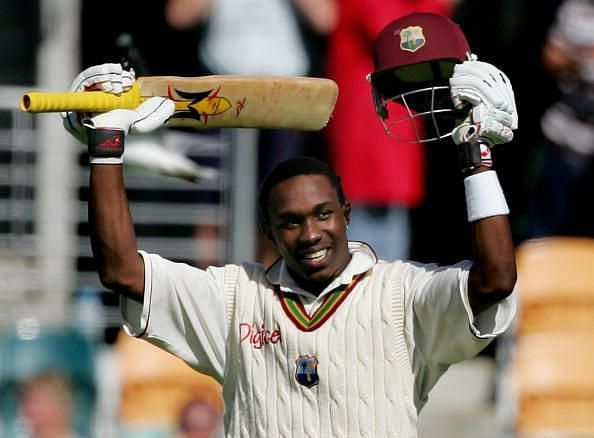
Several T20 records sit next to his name over the last decade, but Bravo believes that the building blocks were laid much before, when the formats were limited to just two.
"I had a very good start to international cricket for Windies in Tests and ODIs. I had shown promise back then. When T20s came about, it was easy because teams around the world had already seen the abilities I had shown in the ODI and Test arenas."
"I had success in the longer format as well. Without the experience of playing the longer format, batsmen struggle when they walk out to bat to play a defensive or supporting role".
"It helped me give a foundation to my game. Sometimes, in T20s, your team is in trouble at 50-5, or 60-6, with another 10/11 overs to bat. You then rewind the clock and remember that you have the ability to bat for a long period and play a sensible innings".
Bravo has been a darling of crowds, and franchises, wherever he has played. A story goes that Mr Ambani's private jet flew the all-rounder all the way to Sabina Park ahead of a Test against England in 2008 after he had decided to stay with Mumbai Indians for a few extra IPL games.
His ascension to being an all-time great in the IPL, however, coincided with his time at the Chennai Super Kings. Two titles and more than a 100 wickets later, Bravo is a starry name in CSK's Hall of Fame.
"When I got the Chennai Super Kings jersey, I was already an international player. I had played three years for the Mumbai Indians, so the trust was already there".
Under MS Dhoni's captaincy, Bravo flourished more than anywhere else. And a lot of that had to do with their complementary personalities.
"He (Dhoni) allowed me to be myself, set my own fields, be my own leader. It was very easy. He is the type of captain who allows players to make mistakes and grow from them. He stands behind them and only intervenes if he thinks it is necessary.
"Now that's good because it allows players to grow and take their game on their own and not really depend on the captain".
"Dhoni isn't a big fan of meetings in T20 cricket"
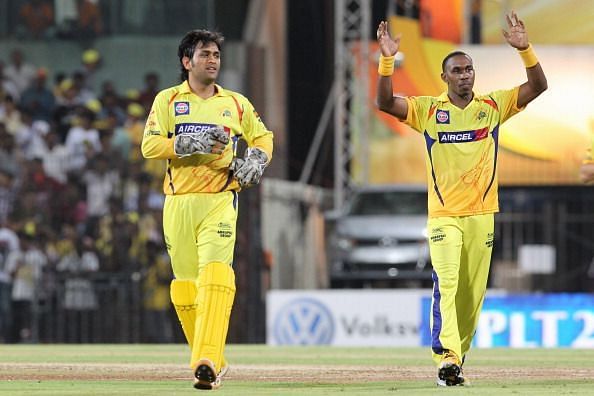
"He is very easy going, not someone who's a big fan of team meetings for T20 cricket. I am also the same and we both click".
"I have learnt a lot from him, about the game about composure, about understanding how to deal with different players. Being captain cool and being able to sit down and have a chat is good - it helped me as a leader and as a player and I am happy".
Coach Stephen Fleming, after CSK's third IPL title in 2018, had lauded MS Dhoni's strong influence on his players and how he had specific roles for each player, backing them to succeed. Bravo believes that having a strong core has been the reason behind CSK's continued success.
"It's a team sport. The closer a team is the better the players perform; they play for you, they play for the country or the franchise, whatever it is".
"Being able to have the core of the players most of the time and building around them makes life easier. That's the reasons for CSK's success over the years and it will be in the years to come".
CSK's weapon for years now, Bravo made a name for himself with his subtle variations that outwit the best of batsmen. Often rolling his fingers across to bowl cutters, and mix his slower balls with his pacy yorker, Bravo's ammunition seems to be endless.
For Bravo, death bowling is as much of a mental battle of wits as it is a skill-v-skill match-up.
"I constantly keep my eye on the batsman, and on the score. I have always told my players - let the scoreboard dictate how you play. For me, it is about game awareness, knowing the batsman's strengths, sticking to my own strengths also and being able to read the game and try to outfox the batsman as much as possible".
"I try to keep it very simple, especially in the death overs".
"The yorker is the safest ball"
In times of rising (run and heart) rates, Bravo's mantra is to religiously stick to two of his most trusted aides, the yorker and slower balls.
"I believe these are the two most important deliveries in the shorter formats; especially the yorker. It is the safest ball. If you are a bowler who has a good yorker, and can rely on a yorker any time, it can make the job a lot easier".
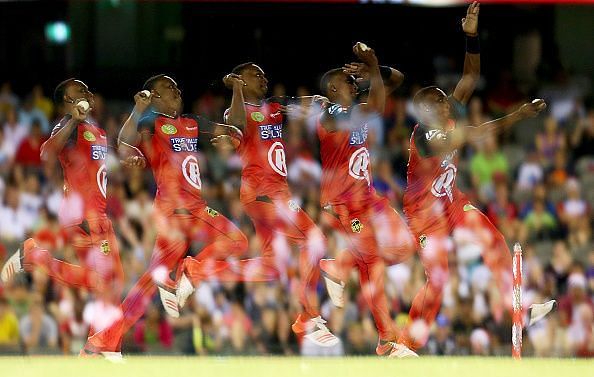
When it comes to variations, there's no one-stop shop for everyone. From match equations to the kind of batsman he is faced with, Bravo's experimentation is situation-based. He admits to changing his mind very frequently, often during his way up to the popping crease.
"I do it a lot. Especially to batsmen who are unpredictable: who lap sweep, reverse sweep, who run down the wicket - guys like Brendon McCullum and AB de Villiers. They are very difficult to bowl to because they have so many shots all around. They can also play those fancy strokes!"
For other batsmen with a specific set of skills, Bravo visualises beforehand what he needs to deliver, and when.
"If I am bowling to an (Andre) Russell, or a (Chris) Gayle or a (Kieron) Pollard who are power hitters, I commit to the ball and decide what to bowl when I am running up - because I know they basically just stand still and use power."
"My brand has evolved due to T20s"
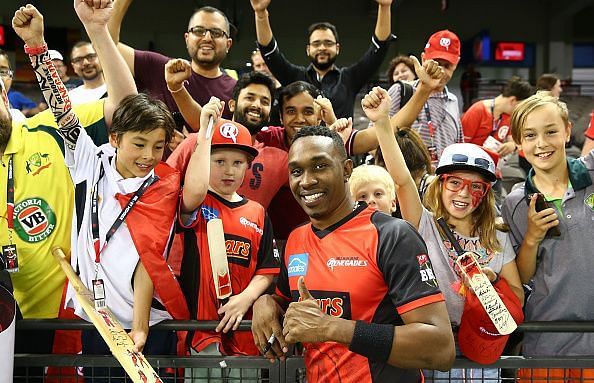
The glitzy, well-enjoyed life, one that has now bifurcated into the music world too, has seen Bravo's immense popularity soar, making him T20 cricket's all-round baron.
"My brand has developed and evolved due to T20 cricket. It helped me in playing over 400 games around the world and becoming the first bowler to take 400 wickets, which is a big achievement".
As he walks towards the twilight of his career, Bravo admits that today's generation is doing well for themselves, and their families, in the shortest formats.
"Today's young talent is really good. It is great to see that players don't have to play Test or ODIs to make a name for themselves, or to make a living. This is what T20 cricket has done - it's created life-changing moments for them and their families, and that's important".
Continuous travel, coupled with the debilitating surgeries have taken a toll, but Bravo isn't done yet.
"Playing in these (T20) tournaments and winning titles means a lot to me, not just to play but to win - I like to play as long as possible. Just to keep myself healthy and my brand going".
The game itself is much more structured and bound by lines, but Bravo's quirkiness still spreads unadulterated joy, as he continues to play with a song on his lips and a childish twinkle in his eyes.
"Everybody know say Bravo a champion!"